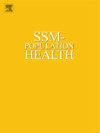在教育和健康人口研究中调整遗传混杂的经验教训
IF 3.1
2区 医学
Q1 PUBLIC, ENVIRONMENTAL & OCCUPATIONAL HEALTH
引用次数: 0
摘要
社会科学家经常用一系列协变量来拟合回归模型,以推断观察性的、基于人群的数据的因果关系,但由此产生的估计可能会受到未知的、未测量的和测量不良的混杂因素的影响。使用多基因指数(PGIs)调整遗传混淆已被提出作为减少这种偏差的一种方法。然而,当更广泛地调整pgi或遗传混淆时,社会科学家感兴趣的关系是否以及如何改变,仍然知之甚少。目前的研究通过评估受教育年限与自我评估健康、体重指数和抑郁症状之间的关系,利用2006-2012年健康与退休研究(n = 11,614)的数据,调整了遗传混杂因素前后的关系,揭示了这一问题,这是一项针对美国老年人的全国性代表性研究。我们通过两种方式调整遗传混淆:一种是控制pgi,另一种是使用基于方差分量估计的多基因遗传混淆推断(PolygENic genetic confoning INference, PENGUIN)方法。我们发现,对pgi的控制适度削弱了教育与每项健康指标之间的关联,而PENGUIN进一步削弱了估计值。然而,在对两种方法的遗传混淆进行调整后,教育和健康之间仍然存在显著的保护关系。因此,利用现有方法对遗传混杂因素进行调整并不会质疑教育与健康之间的牢固关系,从而强调了社会和行为因素在形成教育健康差异方面的根本作用。我们的研究结果也说明了调整基因混杂与特异性pgi的局限性。在一个社会科学家在基于人群的数据集中广泛使用pgi的时代,我们敦促在使用它们作为遗传混淆的控制时要谨慎。本文章由计算机程序翻译,如有差异,请以英文原文为准。
Lessons in adjusting for genetic confounding in population research on education and health
Social scientists often fit regression models with a range of covariates to infer causal effects in observational, population-based data, but the resulting estimates may be biased by unknown, unmeasured, and poorly measured confounders. Adjusting for genetic confounding using polygenic indices (PGIs) has been forwarded as one way to reduce this bias. However, whether and how relationships of interest to social scientists change when adjusting for PGIs or genetic confounding more broadly remains poorly understood. The current study sheds light on this issue by evaluating associations between years of schooling and self-rated health, body mass index, and depressive symptoms before and after adjusting for genetic confounding using data from the 2006–2012 waves of the Health and Retirement Study (n = 11,614), a nationally representative study of older U.S. adults. We adjust for genetic confounding in two ways: first by controlling for PGIs, and second by using PolygENic Genetic confoUnding INference (PENGUIN), a method based on variance component estimation. We find that controlling for PGIs modestly attenuates associations between education and each measure of health, and PENGUIN attenuates estimates further. However, a significant protective relationship between education and health remains when adjusting for genetic confounding with either method. Adjusting for genetic confounding using available methods thus does not call into question the robust relationship between education and health, underscoring the fundamental role of social and behavioral factors in shaping educational health disparities. Our findings also illustrate the limitations of adjusting for genetic confounding with PGIs specifically. In an era where PGIs are now broadly available to social scientists in population-based datasets, we urge caution when using them as controls for genetic confounding.
求助全文
通过发布文献求助,成功后即可免费获取论文全文。
去求助
来源期刊

Ssm-Population Health
PUBLIC, ENVIRONMENTAL & OCCUPATIONAL HEALTH-
CiteScore
6.50
自引率
2.10%
发文量
298
审稿时长
101 days
期刊介绍:
SSM - Population Health. The new online only, open access, peer reviewed journal in all areas relating Social Science research to population health. SSM - Population Health shares the same Editors-in Chief and general approach to manuscripts as its sister journal, Social Science & Medicine. The journal takes a broad approach to the field especially welcoming interdisciplinary papers from across the Social Sciences and allied areas. SSM - Population Health offers an alternative outlet for work which might not be considered, or is classed as ''out of scope'' elsewhere, and prioritizes fast peer review and publication to the benefit of authors and readers. The journal welcomes all types of paper from traditional primary research articles, replication studies, short communications, methodological studies, instrument validation, opinion pieces, literature reviews, etc. SSM - Population Health also offers the opportunity to publish special issues or sections to reflect current interest and research in topical or developing areas. The journal fully supports authors wanting to present their research in an innovative fashion though the use of multimedia formats.
 求助内容:
求助内容: 应助结果提醒方式:
应助结果提醒方式:


